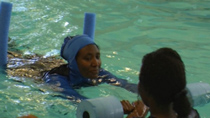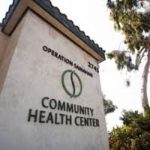Community outreach is a basic tenet of the school.
Working with SD’s United Women East African Support Team (UWEAST)

Principal Investigator: Dr. Amy Pan
Dr. Amy Pan, IPH Senior Researcher, has a long history of working with San Diego’s refugee and immigrant communities including East African, Hispanic and Asian Pacific Islander. For several years now, Dr. Pan has provided on-going support for a number of programs initiated by the United Women East African Support Team (UWEAST).
Currently, Dr. Pan, in collaboration with UCSD Community Pediatrics, is assisting UWEAST with the evaluation of a unique, recently created Swimming Program for Muslim women at the Copley YMCA in City Heights. The foundation of the evaluation plan involves interviewing the women participating.
Girls Invest: Financial Literacy and Economic Empowerment is Critical to Sexual and Reproductive Health among Adolescent Girls
 Principal Investigator: Elizabeth Reed, ScD, MPH
Principal Investigator: Elizabeth Reed, ScD, MPH
Girls Invest is a program to reduce economic vulnerability and poor health outcomes among adolescent girls from low-income backgrounds. Girls in this program are linked to a savings account that provides an initial deposit of $100 based on completion of an app-based financial literacy training.
Girls Invest aims to reduce economic vulnerability and increase girls’ financial knowledge to support economic and career development via innovative technology (videos, gaming dynamics). The intervention covers basic financial literacy (e.g. loans, interest, credit cards, educational loans), and gender-specific topics (e.g., money, power, and relationships; gender roles and girls’ education). As girls advance through the five levels, they are provided with funds deposited into a savings account, totaling $100.
Activity Spaces and Spatial Mobility: STI Risk among Adolescent Females
Principal Investigator: Elizabeth Reed, ScD, MPH
 The Activity Spaces and Spatial Mobility Study aims to assess risk factors for STI and pregnancy among adolescent girls residing in the US-Mexico border region of San Diego County. The primary focus of this study is to assess the role of activity spaces (i.e. locations of social and sexual interaction) and spatial mobility (i.e. movement across geographic locations) on STI risk. In the past decade, there has been increasing interest in the role of geography and how neighborhood-level factors may impact risk for violence and STI. This project aims to expand upon this previous work by examining the dynamic movement of individuals across politically-defined geographic units and the activity spaces outside of the home in which risky sexual behaviors are occurring.
The Activity Spaces and Spatial Mobility Study aims to assess risk factors for STI and pregnancy among adolescent girls residing in the US-Mexico border region of San Diego County. The primary focus of this study is to assess the role of activity spaces (i.e. locations of social and sexual interaction) and spatial mobility (i.e. movement across geographic locations) on STI risk. In the past decade, there has been increasing interest in the role of geography and how neighborhood-level factors may impact risk for violence and STI. This project aims to expand upon this previous work by examining the dynamic movement of individuals across politically-defined geographic units and the activity spaces outside of the home in which risky sexual behaviors are occurring.
The evaluation of a microfinance project for women in Tijuana: “ESTIMA: Economic and Social Empowerment to Increase Upward Mobility Among Women”
 Principal Investigator: Elizabeth Reed, ScD, MPH
Principal Investigator: Elizabeth Reed, ScD, MPH
The ESTIMA microfinance project addresses economic vulnerability among highly marginalized women in Tijuana, Mexico by providing business training and microfinance loans. ESTIMA seeks to promote women’s financial well-being and independence. Women participating in the ESTIMA project also receive support through a group-led approach that mobilizes women to work together in addressing multiple life challenges (e.g. unstable housing, difficulty accessing needed permits or training, childcare challenges, gender-based violence) to ensure their success.
Among the women ESTIMA works with, most have not had access to education or training opportunities, many have been trafficked into sex trade or involved in sex work as a means of economic survival, and most have experienced other forms of gender-based violence, including partner violence, that have also contributed to women’s economic vulnerability. For example, many women have had to struggle to financially support themselves and their families on their own in order to escape from abusive home environments. The majority of women in ESTIMA report having children and being the primary or sole breadwinner for their children, with no other financial support from other family members or male partners. Thus, by promoting women’s economic independence and financial well-being, ESTIMA offers women control over their lives and the ability to provide for their families safely.
The Hospital Association of San Diego & Imperial Counties (HASD&IC)
Community Health Needs Assessment (CHNA) Phase I and Phase II
I n September 2012, the Hospital Association of San Diego and Imperial Counties (HASD&IC) contracted with the IPH to conduct a community health needs assessment (CHNA) for San Diego County. This CHNA was a collaboration between HASD&IC and seven local San Diego hospitals, and was officially called the HASD&IC 2013 Community Health Needs Assessment. Representatives from all seven hospitals formed the CHNA Advisory Workgroup who provided input throughout the CHNA process. The 2013 CHNA used a multi-level, hospital-focused analysis to identify the priority community health needs in San Diego County. The results of the HASD&IC 2013 CHNA are available at HASDIC’s website.
n September 2012, the Hospital Association of San Diego and Imperial Counties (HASD&IC) contracted with the IPH to conduct a community health needs assessment (CHNA) for San Diego County. This CHNA was a collaboration between HASD&IC and seven local San Diego hospitals, and was officially called the HASD&IC 2013 Community Health Needs Assessment. Representatives from all seven hospitals formed the CHNA Advisory Workgroup who provided input throughout the CHNA process. The 2013 CHNA used a multi-level, hospital-focused analysis to identify the priority community health needs in San Diego County. The results of the HASD&IC 2013 CHNA are available at HASDIC’s website.
 As part of their ongoing efforts to create stronger partnerships within San Diego communities, HASD&IC and the participating hospitals designed a collaborative follow-up process (Phase II) to review methodology and gain a deeper understanding of the 2013 CHNA results. The goal of Phase II was to ensure that the results of the 2013 CHNA accurately reflected the health needs of the community. HASD&IC again contracted with the IPH to provide assistance with the implementation and interpretation of Phase II through two main activities:
As part of their ongoing efforts to create stronger partnerships within San Diego communities, HASD&IC and the participating hospitals designed a collaborative follow-up process (Phase II) to review methodology and gain a deeper understanding of the 2013 CHNA results. The goal of Phase II was to ensure that the results of the 2013 CHNA accurately reflected the health needs of the community. HASD&IC again contracted with the IPH to provide assistance with the implementation and interpretation of Phase II through two main activities:
- Conduct community dialogues to share the results of the 2013 CHNA with the community and collect community member feedback on hospital programs that were guided and informed by the results of the 2013 CHNA.
- Create and analyze an electronic survey of community leaders and health experts who reviewed the methodology and findings from the 2013 CHNA.





